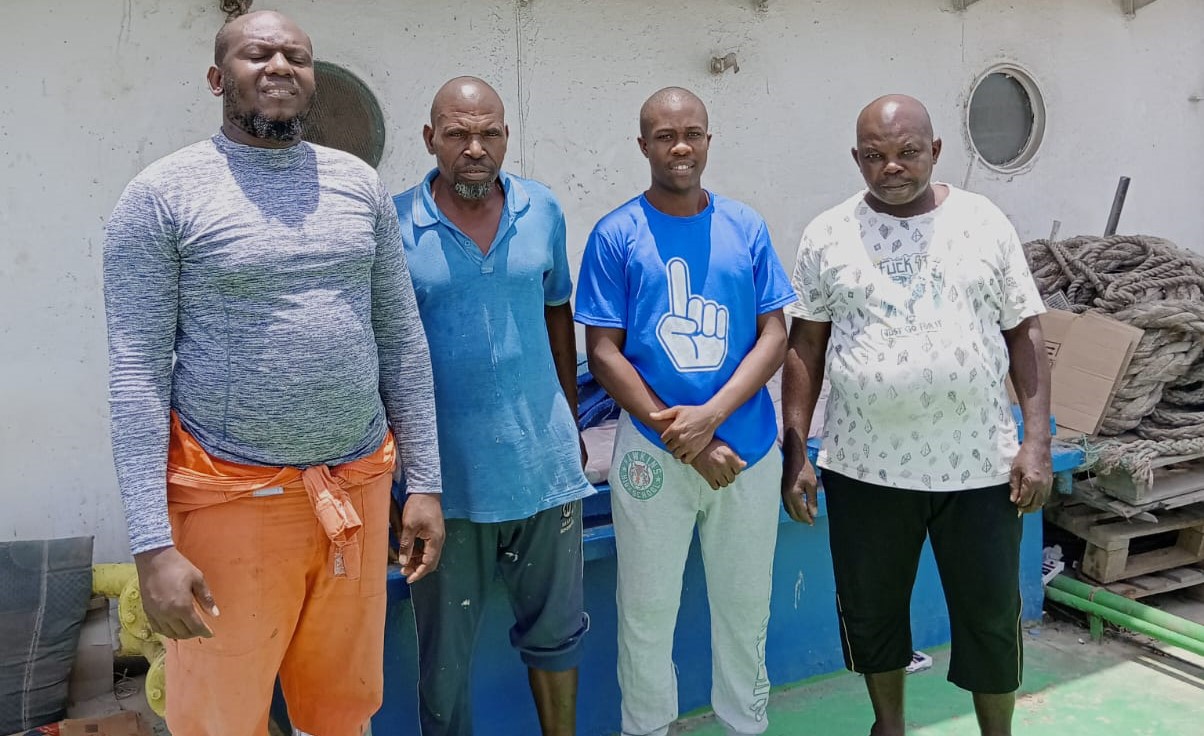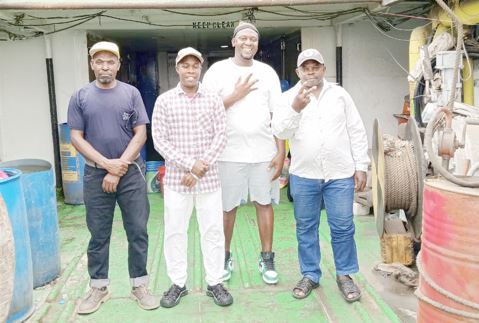Kenyan seafarers face rough times on foreign vessels as local jobs dwindle

Seafarers Union of Kenya says some seamen were misled by unlicensed agents or left unemployed despite promises of lucrative opportunities aboard.
When Juma Tella, Mwamba Nuru, Omar Mwalimu, and Abdulrahman Iddi embarked on their journey aboard the Somali-flagged fishing vessel FV Saharla, they saw it as a chance to secure a better future for their families.
Little did they know that their aspirations would turn into a harrowing tale of abandonment and struggle.
More To Read
- Fresh leadership ushers in new era for Kenyan seafarers
- Kenyan seafarers to get globally standardised ID within three months
- Boost for Kenya's seafarers as state commissions identity document
- Kenyan seafarers return home after abandonment in Oman, await unpaid wages of Sh1.6M
- Union urges state to rescue four Kenyan seafarers stranded in Oman
- Relief for seafarers as government reduces maritime training fees to Sh15,000
The men, employed by a Somali national and American citizen who owned the vessel, found themselves stranded without pay or provisions after their employer allegedly failed to pay dry dock fees.
"We were left to fend for ourselves with dwindling supplies and no means to return home," lamented Juma.
Their plight highlights a recurring issue faced by many Kenyan seafarers seeking opportunities abroad due to limited opportunities locally.
According to Ali Khalfan, a marine engineer, the scarcity of local jobs forces seafarers to pursue employment on foreign vessels, often leading to exploitation and neglect.
"When you have been unemployed for more than a year after graduation then you get an opportunity, it is hard to say no. Some people are just looking for experience hoping it will open up better opportunities for them," said Ali.
Ali said most are forced to work under harsh conditions to earn a living.
"A dollar a day is better than nothing. Some seamen are forced to work under minimum wage,” he pleaded.
Exploitation
He pleaded with the government to put in place strategies that would give seamen more opportunities and protect them from exploitation by overseas companies.
Atie Swaleh, the secretary-general of the Seafarers Union of Kenya, noted that a large percentage of seamen working overseas are facing various hardships.
 Atie Swaleh, the secretary-general of the Seafarers Union of Kenya addresses the media in Mombasa on July 27, 2024. (Photo: Mishi Gongo)
Atie Swaleh, the secretary-general of the Seafarers Union of Kenya addresses the media in Mombasa on July 27, 2024. (Photo: Mishi Gongo)
She said there is an urgent need for the government and the industry to intervene to safeguard seafarers' rights and ensure their protection.
Atie criticised the lack of transparency in recruitment processes, citing cases where seafarers were misled by unlicensed agents or left unemployed despite promises of lucrative opportunities.
Some of the challenges Kenyan seafarers face include mistreatment, arrests, and even deaths abroad, exacerbated by the lack of communication with authorities or the union, Atie said. She urged the seamen to register with the union.
At the same time, she asked the seafarers to inform the union or the Kenya Maritime Authority (KMA) before embarking on any job overseas, emphasising their role in providing support and advocacy. She said some seafarers face challenges while on duty but have no one to report to since they are not registered.
She estimated that around 5,000 Kenyan seafarers are currently working abroad, but the union and KMA lack accurate data.
"We need strict oversight and vetting of recruitment agencies," she said.
Stringent vetting
Atie called on maritime stakeholders and the government to address employment challenges faced by Kenyan seafarers, advocating for stringent vetting of recruitment agencies and improved oversight to protect workers' rights.
 The four Kenyan seafarers who were stranded in Oman for over a year. They were successfully brought back into the country. (Photo: Mishi Gongo)
The four Kenyan seafarers who were stranded in Oman for over a year. They were successfully brought back into the country. (Photo: Mishi Gongo)
"At this critical time, we urge the government and maritime stakeholders to intervene swiftly. Our seafarers deserve better treatment and protection," Atie said.
She said the plight of the seafarers underscores the urgent need for comprehensive reforms to safeguard the welfare of Kenyan workers in the maritime industry, ensuring they are adequately supported and protected both at home and abroad.
KMA, which is responsible for regulating the sector, acknowledged these challenges and pledged to enhance maritime education and training to international standards.
KMA's Safety Director Julius Koech revealed that there have been agreements with nations like South Korea and Panama to recognise Kenyan certifications, expanding job opportunities for seafarers.
Peter Munga, the director of maritime education, training, and labour, stressed the government's commitment to creating more sea-time opportunities for Kenyan seafarers, vital not only to the maritime sector but also to the nation's economy.
Despite these efforts, concerns persist regarding the welfare of seafarers both at sea and upon returning home.
KMA reported that only a handful of recruitment agencies are licensed, urging seafarers to sign binding employment agreements to safeguard their rights.
In response to these challenges, stakeholders are calling for unity and discipline among seafarers, emphasising the need for collective action to address systemic issues and ensure a brighter future for all maritime workers.
Top Stories Today











































